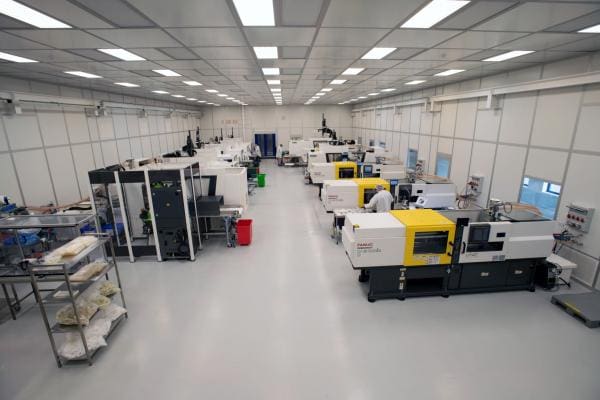
Cleanroom Investment Puts Boddingtons in a League of its Own
If there were any doubts about the need for cleanroom-controlled conditions in manufacturing, the past 18 months have removed them. With over £6.5 million invested in its cleanroom facilities over the last 5 years, Boddingtons Plastics is perfectly placed to meet the rising demand for medical manufacturing.
The need for increased medical and healthcare products and services has received a quantum boost over the past 18 months. Mandatory and international healthcare and medical device standards make cleanroom production a necessity for many classes of products. For suppliers, no cleanroom means no business.
Long before COVID-19 hit, Boddingtons had proven itself to be a leader in cleanroom-based manufacturing futures. To date, the Kent-based company has ploughed some £6.5m investment in the technology over the past five years.
Facilities and equipment are nothing in themselves, however. The Boddingtons manpower, expertise and the close involvement of the company’s clients in this detailed work make the company thrive.
These Class 7 facilities are the jewel in the crown for many new customers and the first port of call on factory tours. Production Manager Wayne Allen notes that “naturally our cleanroom facilities are a clear marketing asset. In many respects, they look and perform in a league of their own – and well ahead of our competitors.”
“Looks and appeal are one thing, but hard graft, continuous resourcing and details are another,” adds Allen. “Firstly, every member of staff that enters the cleanroom is required to undertake full training. Every piece of equipment considered for use in the cleanroom has to be either made bespoke for cleanroom use or adapted. For example, you cannot source a wooden table or desk as that would shed particles. More highly specified and expensive equipment needs to be resourced – in stainless steel.”
Cleanliness is an engrained fact of operational life at Boddingtons. “Machine operators have to fully clean benches and their work area every eight hours (at the start of each shift),” continues Allen. “A dedicated cleaning team then spends a total of three hours per day undertaking mandatory and fixed activities. These tasks include cleaning every aspect of the production equipment, together with the cleanroom walls and floors.”
In addition – and according to Class 7 protocols – a deep clean is required every six months. “The room is shut down for 24 hours and a team of people clean everything there from top to bottom with a range of products and techniques,” explains Allen.
Class 7 cleanroom maintenance is another topic where different daily, weekly and monthly maintenance checks must be performed.
“Air pressure is monitored constantly to ensure that the room is always maintained at positive pressure,” notes Allen. “In addition to that, we are required to make arrangements whereby the room gets externally validated to ISO 14644-1 for particle and pressure testing. Regular airflow testing is also required as standard.”
The Boddingtons Quality Assurance department also has a key role to play in many activities. “On a structured basis, QA will put out settle plates to monitor the particles in the air. QA will also deploy contact plates and will then check surface areas for bacteria. These plates are then regularly sent out to external labs for checking,” says Allen.
Work for clients may be mandated for the company’s Class 7 cleanrooms and may then often drive additional requirements and expansion in other areas of manufacturing.
A new project has necessitated the purchase of six additional injection moulding machines, with another three on order. The work also resulted in the expansion of the Motan central materials handling feed system at Boddingtons. A second materials link was created, “one which ensures we have a dedicated material feed line to this part of the cleanroom, ensuring no cross-contamination and full traceability,” says Allen.
In this way, the cutting edge of the Class 7 cleanroom drives further manufacturing innovation at Boddingtons. The original cleanroom footprint was doubled in size 18 months ago and recent additions have increased cleanroom capability by 100m² since then.
Given the range and complexity of the various operations within these facilities, it has made sense for Boddingtons to make a full inventory of the diverse skills needed for optimum functioning.
Allen says, “we have developed an in-house training course for cleanroom operatives that involves two days full training in the classroom before entering the cleanroom environment. Our in-house material includes cleanroom principles and procedures but also trains and educates on matters of quality standards, the injection moulding process, good document practice, and so on.”
If the current sales trajectory continues, Boddingtons’ cleanroom capacity will likely be filled within the next six months. Further expansion and investment is then likely to be needed. The increasingly experienced team in Marden will be more than able for the task.

Boddingtons
+44 (0)1622 833700
Website
Email





